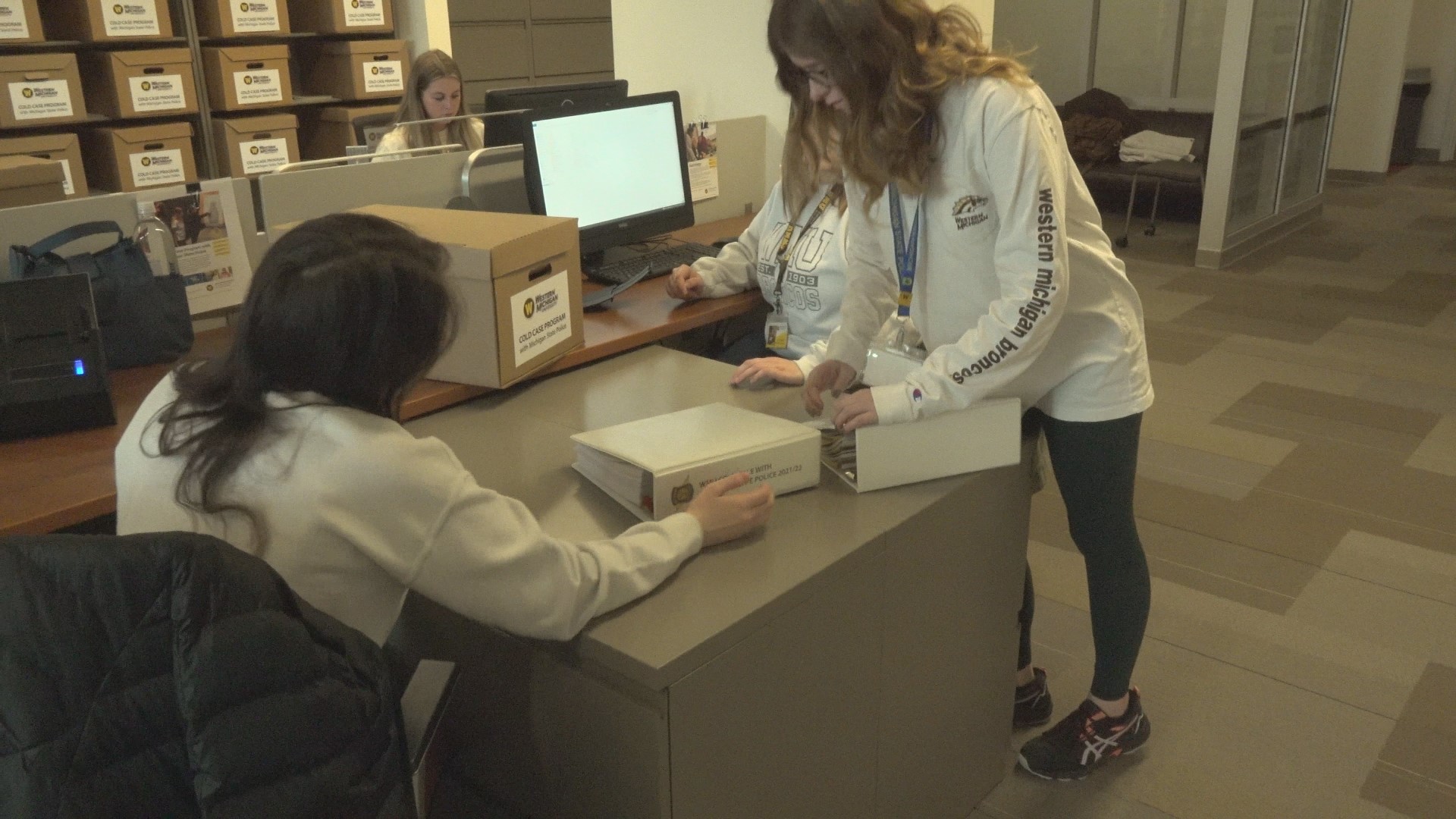KALAMAZOO, Mich. — Western Michigan University (WMU) has a first-of-its-kind program in the U.S. enlisting an elite group of college students to help Michigan State Police solve cold cases.
Rachel Moore is a junior at WMU and a participant of the university’s Cold Case Program. She said not many other college students get this sort of experience.
“What program allows you to look at cold cases from 1980s, 1990s? There’s nothing like this.”
Dr. Ashlyn Kuersten, known as Dr. K to her students, is a criminal justice professor and also the director the Cold Case Program.
“I think people don’t give these college students enough credit,” said Dr. K.
It was after a friend in law enforcement complained about too many cold cases and not enough people to solve them that the professor thought, “I have all these really bright students and I’m always searching for a real-world research project.”
In time, the Western Michigan University Cold Case Program was born.
“They do everything from – we just toured a murder scene last week. They find death records and property ownership records and military records and anything that would make the case better,” said Dr. K.
“There’s thousands of pages that we scan through our scanners and then it is digitalized into a PDF document,” said Moore, demonstrating the process. “They can just search one letter word and any page that has that word on it they can look at it. So, it allows detectives to look for things within seconds instead of digging through old documents and pages.”
“The very first case that my students helped MSP on, MSP got an arrest and a plea deal,” said Dr. K, referring to the murder of Roxanne Wood, a case that had gone unsolved for more than 30 years and was solved in 2022 with the help of the WMU Cold Case Program.
Brandon Uckley is a senior program participant who said, “There’s just something about reading old police files and just looking through like White Pages trying to find people. It’s just something about that, that really just tickles like a certain part of my brain.”
He recalled just how eager he was to join once he found out about the program from Dr. K after taking one of her classes, saying, “That sounds amazing. As soon as she said that, I applied.”
Not just anyone can join. Besides an essay submission, plus meeting GPA and course requirements, “the students have to submit to a background check,” said Dr. K.
The students are also sworn to secrecy and Dr. K explained, “That means, they can’t talk to their parents or their roommates or even my colleagues about the cases that they’re working on.”
This is something the professor says her career depends on.
“My credibility is shot if they release something that shouldn’t be released and they’ve never let me down,” said Dr. K.
The students look up to those who protect and serve and many participants are even considering their own careers in law enforcement.
“I am interested in going into the academy for Michigan State Police or going into the FBI,” said Moore.
Uckley has similar plans, saying, “Once I graduate here, I’m going to go to trooper school. Hopefully, be a trooper for a couple years and move up to a detective.”
Perhaps, all part of growing interest in true crime, a trend that Dr. K says is happening for a reason.
“Part of this love of these new true crime stories is that a lot of these cold cases are being resolved by law enforcement because the DNA technology has improved so much,” said Dr. K with a hopeful outlook. “I think we’re going to get to a point, I hope, where we don’t have cold cases.”
“The work we do, at least in this program, is not typically fun. It’s just a lot of reading and all that type of stuff and I’m not a huge fan of reading but yet I still love coming into here all the time,” said Uckley.
Moore added that, “It’s not only important to the victims’ families but for us, too. I feel like we are making a difference and I’m so glad we get the opportunity to.”
“It’s a lesson, too, for those monsters on the street. If you did something and you left your DNA, we’re going to find you,” said Dr. K.
The program is only open to WMU students, though Dr. K says she gets hundreds of calls each week from people all over wanting to join and help solve cold cases.
Dr. K is currently travelling the country encouraging other universities to start similar programs.
►Make it easy to keep up to date with more stories like this. Download the 13 ON YOUR SIDE app now.
Have a news tip? Email news@13onyourside.com, visit our Facebook page or Twitter. Subscribe to our YouTube channel.

